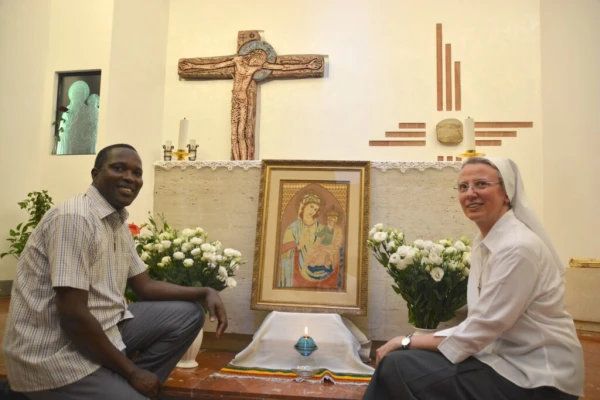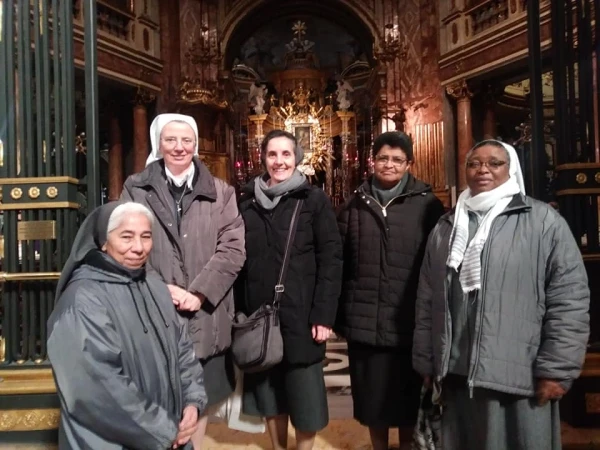Pope Francis has once again marked a milestone in his pontificate by appointing, for the first time in the history of the Catholic Church, a woman to command a Vatican Dicastery. This is the Italian nun Simona Brambilla, appointed Prefect of the Dicastery for Institutes of Consecrated Life and Societies of Apostolic Life.
Sister Brambilla, who will turn 60 on March 27, had been serving as secretary of the same dicastery since October 2023. At that time she was the second woman to hold such a position, after in 2021 Sister Alessandra Smerilli was appointed to the Dicastery for the Service of Integral Human Development.
Receive the main news from ACI Prensa by WhatsApp and Telegram
It is increasingly difficult to see Catholic news on social media. Subscribe to our free channels today:
Furthermore, just last month, exactly on December 13, 2024, Sister Brambilla was appointed by the Pope to be member of the Ordinary Council of the General Secretariat of the Synodan entity that “is responsible for the preparation and holding of the Ordinary General Assembly” of the Synod of Bishops.
About that appointment, the Italian nun said: “I deeply believe in the synodal path. We have lived and are living an experience of the Spirit, which drives the Church to walk together, in mutual listening and reciprocal edification. “There is no going back from this experience.”
“There is progress; It deepens, in a spiral movement that, with strength and gentleness, takes us to the essentials of who we are as Christians: brothers and sisters in Christ. Lightened, disarmed and freed from the various armor and ornaments that we can wear,” he added.

A few years earlier, in July 2019, Sister Brambilla and six other women became the first members of the Dicastery for Institutes of Consecrated Life and Societies of Apostolic Life.
Brambilla, who already as secretary has supervised the apostolic visit to the Priestly Fraternity of Saint Peter and the suppression of the Carmelite Monastery of the Holy Trinity in Arlington, Texas, was for 13 years Superior General of the Missionaries of the Consolata.
To the congregation, which she joined in 1988 and of which she was also the first general councilor, she owes the opportunity to have been a missionary in Mozambique, an experience that allowed her to write a thesis on evangelization and inculturation in the African country, to obtain the doctorate in psychology in 2008, at the Gregorian Institute of Psychology. He has also been a teacher at that study center.
The nun is also a professional nurse, practicing that profession at the Merate hospital, in Italy.
In October 2023, in a interview given to ACI Stampa – Italian agency of EWTN News – the nun shared that “the experience of fruitful contact with diverse realities, peoples, cultures, particular Churches, forms of consecrated life in Africa, America, Asia and Europe has transformed me and has reinforced in me the awareness that the encounter with the other is a source of growth, of exchange of gifts, of grace” with the call to “sow the Gospel” and make it germinate everywhere.
What to do to renew consecrated life?
In that interview, Sister Simona Brambilla responded to the question like this: “I feel the need and the desire to put myself in the school of someone who knows more and has more wisdom than me and has long offered his own skills and energies of mind, heart and soul to accompany consecrated men and women in various environments.”

In this way, he continued, he will be able to help better, also considering the importance of listening “to everyone, their various experiences and path, which is a fundamental step to let the Spirit guide us, to open our hearts and inner senses to His light (…) to show us his paths and to travel them together.”
The nun also highlighted the importance of “smallness”, when questioned about the lack of vocations in the Church, offering as a point of reference a speech by Pope Francis from September 2022.
Sister Brambilla quotes, among others, the following passage: “the Gospel says that being small, poor in spirit, is a beatitude, the first beatitude, because smallness humbly surrenders us to the power of God and leads us not to ground ecclesial action. in our own capacities. This is a grace! I repeat: there is a hidden grace in being a small Church.”
Was your election a recognition of women in the Catholic Church?
In January 2024, the new Prefect gave an interview to the Avvenire newspaper of the Italian bishopsin which she said that her election then as secretary of the Dicastery of Consecrated Life, “finds its place in an ecclesial path that is increasingly synodal, open, inclusive, dialogic and evangelical,” and in which she recalled what Pope Francis said in his homily on January 1 of that year.
“The Church needs Mary to rediscover her own feminine face: to be more like her, woman, Virgin and Mother, she represents the model and the perfect figure; “make space for women and be generative through a pastoral care made up of attention and concern, patience and maternal courage,” the Pontiff then said in part of the excerpt cited by the nun.
When asked if her appointment was going to “demasculinize” the Catholic Church, the new Prefect stressed that “it is a reflection that everyone must continue and expand, but also that must be translated into an effective practice that certainly involves greater participation.” of women at different levels of the life of the Church.”
It also demands “a careful study of the feminine dimension of the Church and of the mission in a broad sense: models and dynamics of thought, affection, sensitivity, spirituality, action, mission that embody the two vital dimensions, the feminine and the masculine, and They take into account the necessary, beneficial interaction. and blessed between both.”
Despite the questions it may have generated, the appointment of Sister Simona Brambilla does not contradict the teaching of the Church. Although the ministerial priesthood is reserved for men, the Church recognizes the equal dignity and complementarity of men and women.
Pope Francis has emphasized the need for a “more incisive female presence in the Church” and this appointment is a step in that direction. Sister Brambilla’s appointment does not imply sacramental functions reserved for the priesthood, but rather an administrative and pastoral leadership role that reflects the wealth of gifts and abilities that women bring to the Church, as demonstrated by the long history of influential women in Catholicism. .

